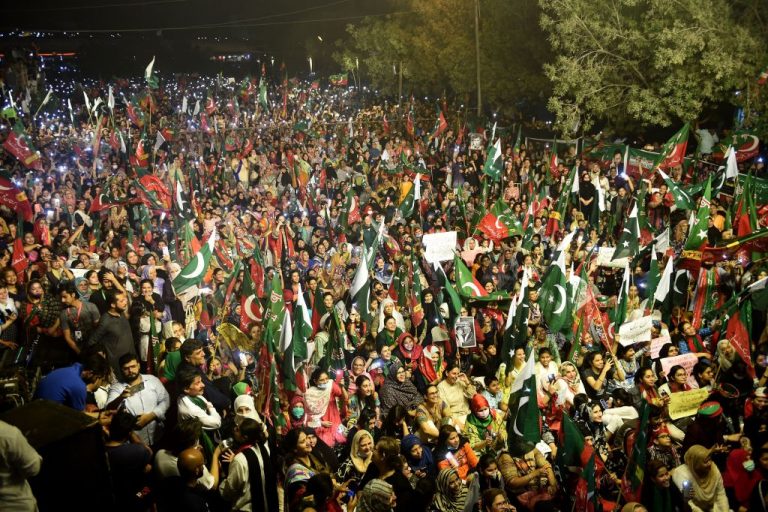Pakistan has appointed Shehbaz Sharif to the seat of prime minister despite enormous crowds gathering across the country in a show of support for former PM Imran Khan, who was deposed in a no-confidence vote last week.
Khan, who was removed from power after losing the support of several key allies in Pakistan’s parliament, still alleges that the United States orchestrated his ouster because of displeasure over a Feb. 24 meeting with Russian President Vladimir Putin.
In an April 10 tweet published the night before Parliament was set to vote on a replacement, Khan showed video of extensive crowds of citizens gathering in support.
A translation of the text stated, “I have never before in my country’s history seen so many people come out on their own today to overthrow the government of bandits.”
April 11 reporting by India Times noted a popular slogan among the crowds was “imported government not acceptable,” which also trended with 2.7 million tweets in the Pakistani Twittersphere.
Success
You are now signed up for our newsletter
Success
Check your email to complete sign up
The newly elected Shehbaz is the brother of Khan’s predecessor, Nawaz Sharif, and leader of the opposition Pakistan Muslim League-Nawaz. He is referred to by his given name Shehbaz, as Sharif is a patronym.
Shehbaz Sharif, who was widely anticipated to secure the win in the April 11 vote, was defeated by Khan in the 2018 election.
An article by The Indian Express said that although Shehbaz, like Khan, “worked closely with China on Beijing-funded projects,” he signaled a more amicable position by calling for a positive relationship with Washington, standing in contrast to Khan’s decidedly anti-U.S. stance.
RELATED READING:
- NATO Sets Its Gaze on Xi Jinping
- EU Parliament Hears Beijing Has a ‘Red Line’ That Russia Should Not Cross
- In Address to National Executives Roundtable, Biden Speaks of Historical ‘Inflection Point’ for Coming ‘New World Order’
The article also noted that Sharif had received the praise of the outgoing Chinese Consul General last year for his effective statesmanship on the China-Pakistan Economic Corridor, part of the People’s Republic of China (PRC) Belt and Road Initiative investment scheme.
The change of leadership in Pakistan may be part of evolving geopolitical tensions surrounding both Vladimir Putin’s invasion of Ukraine and his alliance with Chinese leader Xi Jinping, the latter of which faces the real prospect of regime change as the Chinese Communist Party (CCP) decides whether to grace Xi with an unprecedented third term later this year.
Russian state-media Sputnik News framed Khan’s position that State Department Assistant Secretary of State for South and Central Asian Affairs Donald Lu had contacted Pakistan’s Ambassador directly, demanding Khan cancel a scheduled meeting with Putin that coincided with the beginning of the Ukraine conflict, as fact.
The outlet also noted that Pakistan had abstained from voting on an early March vote in the UN General Assembly condemning Russia for its invasion of Ukraine.
By comparison, the BBC posited that Khan had simply lost the support of Pakistan’s powerful military amid a conflict for power between current leader General Qamar Javed Bajwa and head of Pakistan’s Inter-Services Intelligence spy agency, Lieutenant General Faiz Hameed.
In a more even-tempered approach, Russian state-media TASS angled the issue that although a loss of military support was exactly the cause of Khan’s ouster, the conflict was instead rooted in dissatisfactions over a “foreign policy imbalance towards China.”
TASS paraphrased a Russian expert as stating that “Pakistan cannot become ‘less pro-Chinese,’ it is only capable of becoming ‘less anti-American,’” adding that “the new Pakistani authorities also won’t forget about boosting relations with Russia.”
China’s position on Pakistan’s regime change appeared somewhat uncomfortable by comparison.
An April 12 issuance by communist regime mouthpiece Global Times stated that the change in power “could bring instability,” and that “internal chaos in the country could affect some cooperation projects to some extent.”
PRC Foreign Ministry spokesman Zhao Lijian similarly implied that Beijing is anxious about whether Shehbaz Sharif will continue Pakistan’s pro-Beijing stance, or will gravitate back towards Washington.
Zhao told reporters that the PRC government would “unswervingly insist on a friendly policy toward Pakistan” and that “we believe the political change in Pakistan won’t affect the general picture of China-Pakistan relations.”

















